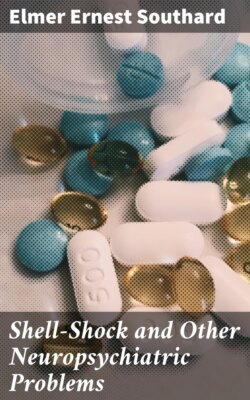Читать книгу Shell-Shock and Other Neuropsychiatric Problems - Elmer Ernest Southard - Страница 79
На сайте Литреса книга снята с продажи.
ОглавлениеEpilepsia tarda in a lance-corporal without hereditary taint or previous history save dizzy spells and excitability.
Case 71. (Bonhoeffer, July, 1915.)
A reserve lance-corporal, 24 years—a soldier from 1911 to 1913 without disciplinary record, and in his second year becoming lance-corporal—was in the campaigns in Belgium, East Prussia, and Poland, making long marches and going through several battles. In the middle of October, 1914, he fell from a horse and suffered a contusion of the thorax, after which blood appeared in the sputum. In November he was brought to the reserve hospital in Berlin, and there had convulsive seizures. Before transfer to the Charité Clinic, a seizure occurred, and he was brought into the clinic in a characteristic dazed state. Thereafter he was clear but often out of humor and irritated. Three weeks later came a brief attack, probably epileptic in nature, with restless half-delirious sleep following.
There was nothing in childhood or in the family history to indicate epilepsy. However, the patient himself stated that from 1913 onward, after his period of military service, he had from time to time felt attacks of dizziness after exertion, and that he had become more easily excitable than before.
The attacks in the lance-corporal are probably not to be attributed to the thoracic contusion, according to Bonhoeffer, because of the long period that elapsed after the thoracic injury, and their development nocturnally without special occasion. According to Bonhoeffer, we are probably here dealing with a late epilepsy.
Re late epilepsy, see also under Case 57. Bonhoeffer makes a considerable point of the lateness in attacks of epilepsy in some of the military cases, pointing out their beginning at the ages of 22 to 27 in the period of peace practice undergone by soldiers. The theory is that cases of severe and long-standing epilepsy are known to the authorities, so that they would not ordinarily be in military service except under conditions of concealment or in case of error. The present case (71) appears to be the nearest that Bonhoeffer has found to a case of epilepsy without heredity and without acquired soil. All that can be regarded as evidence of soil is the dizzy spells and excitability.
Re thoracic contusion, compare remarks of Lépine under Case 69, on Brown-Séquard epilepsy following thoracic wound.
